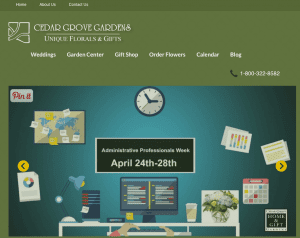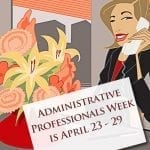
At Cedar Grove Gardens in Boston, the APW message is prominent on the business home page. Promoting the holiday aggressively is key to making sales, said many florists in an SAF post-holiday survey last year.
Partnerships, persistence and patience. Those three attributes seem to be a common thread among florists who experienced success last year with Administrative Professionals Week — an annual event many in the industry say is becoming less and less of a floral celebration.
“We did not expect to have many orders for APW as the holiday has seemed to dwindle in sales for a number of years,” wrote a florist in Georgia, in response to a Society of American Florists’ member survey after the 2016 holiday. “We were pleasantly surprised to see orders coming in, mostly the day of, last minute.”
In fact, about 35 percent of respondents to that survey said APW sales were on par with their 2015 results. About 33 percent said sales decreased, and 29 percent saw an increase. (Many respondents noted the last-minute nature of orders that did come in.)
About 37 percent of respondents said the number of APW transactions remained on par with 2015 transactions. Thirty percent said they decreased; a quarter saw an increase. (The average transaction for APW was about $45, roughly on par with 2015 numbers.)
Many respondents noted that APW simply isn’t top-of-mind with many consumers, a situation that requires florists to be very proactive. In Connecticut, one respondent noted that APW is filled with “potential,” especially for businesses that want to expand their corporate work, but “if you don’t promote this in an aggressive way, you won’t make the sales,” he said, adding that finding the right contact for APW can be particularly tricky, since administrative professionals themselves are often manning phones and fielding emails.
“You have to get to the owner of the companies to get the sales,” he added. “That is a marketing challenge for flower shops that are blocked by the staff that screen the calls.”
In Michigan, “old-fashioned” reminder calls helped one shop get those APW orders.
“We have a list of commercial accounts we call to remind them,” he explained. “Everyone thanked us for the reminder and placed an order.”
Those who saw an increase credited increased advertising (43 percent) and fewer flower shops (23 percent), among other factors. Those who saw a drop-off blamed factors such as competition from other gift vendors (25 percent) and the regional economy (20 percent).

In Farmville, Virginia, Sid Allen has promoted APW for two decades through a contest that draws on partnerships with area businesses. Read more.
Another factor many florists noted in their write-in responses? Timing (smack-dab in the middle of wedding and prom season and in the lead-up to Mother’s Day) as well as ongoing confusion about the celebration and its name. The holiday originated as National Secretaries Week in the 1950s before the becoming Professional Secretaries Week in 1981 and then Administrative Professionals Week in 2000. (The International Association of Administrative Professionals, formerly the National Secretaries Association, founded the celebration.)
A florist in Boston was one of many to note that the business has found success using the previous name alongside the new one.
“We started to refer to it as Secretary’s Day as well as APW because I had heard that using the older, less politically correct name helped some shops increase activity. It seemed to work.”
Respondents reported that, on average, cut flowers constituted about 79 percent of APW sales. Flowering plants made up 13 percent and green plants 11 percent.
Read more about how a florist in Farmville, Virginia, has partnered with a local restaurant and radio station to create a buzz about APW with a contest that’s helped keep the celebration on the mind of area business owners for two decades. Feb 2014 Hands On
Need some help with your own last-minute promotions? SAF has resources to help members promote APW to the media and to consumers.








